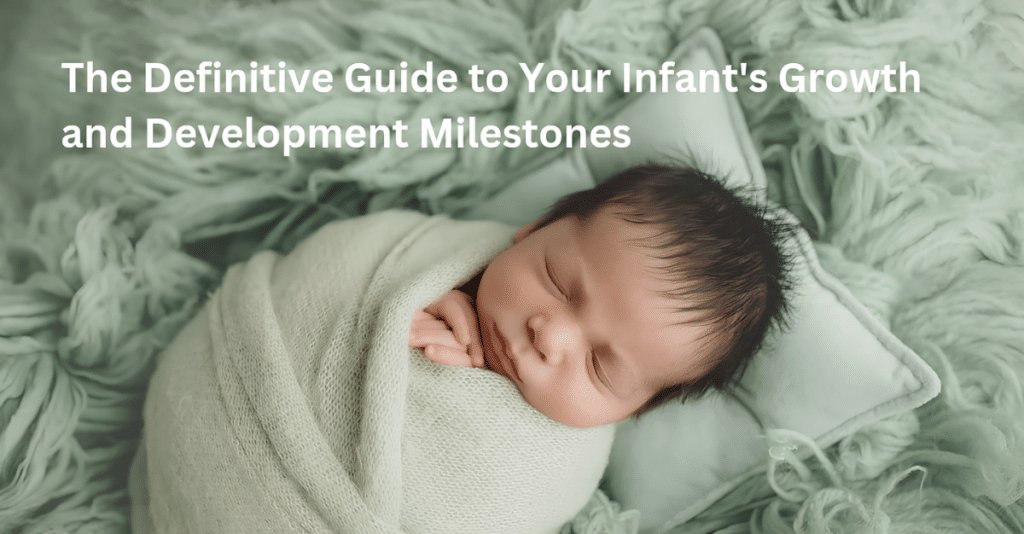The Definitive Guide to Your Infant’s Growth and Development Milestones
The Definitive Guide to Your Infant's Growth and Development Milestones
Are you eagerly watching your little one grow and develop, wondering what milestones they should be reaching next? Understanding your infant’s growth and development milestones is crucial for every parent. From those first adorable smiles to those wobbly first steps, each stage is a stepping stone in their journey of discovery.
In this article, we’ll explore the key milestones in your infant’s physical, cognitive, and social-emotional development, providing you with the knowledge and tools to support them every step of the way.

Physical Development Milestones
1. Building Blocks of Movement
In the early months, your baby’s physical development centres around mastering basic movements. From reflexes like the grasp reflex, where your baby instinctively grips your finger, to the gradual development of head control, these early milestones lay the foundation for more complex motor skills.
By three months, your little one may start to exhibit greater control over their movements, swatting at toys dangling above their play mat.
2. Mastering Motor Skills
As your baby grows, so do their physical abilities.
Around the six-month mark, you might notice them beginning to roll over, a sign that their muscles are gaining strength and coordination.
By nine months, they may be sitting up unaided, eagerly reaching for toys just out of reach. Encouraging tummy time and providing safe spaces for exploration can help support your baby’s physical development.
By twelve months, your baby might be taking their first independent steps, a significant milestone in their journey towards mobility.
Cognitive Development Milestones
1. Sensory Exploration
From the moment they’re born, babies are curious little learners, taking in the world around them through their senses. In the early months, you’ll notice your baby responding to sights, sounds, and touch.
By three months, they may start to track moving objects with their eyes, showing an increased awareness of their surroundings.
2. Unlocking the World of Play
As your baby grows, so does their cognitive ability to understand and interact with their environment.
Around six months, you might observe them beginning to grasp objects with intent, a sign of their growing understanding of cause and effect. Simple games like peek-a-boo can help stimulate their cognitive development and strengthen the bond between you and your baby.
By twelve months, your baby might be imitating simple actions and gestures, indicating their growing ability to understand and communicate.
Social-Emotional Development Milestones
1. The Bonding Experience
Building strong bonds with caregivers is essential for your baby’s social-emotional development.
From the first moments of skin-to-skin contact after birth to the countless cuddles and soothing lullabies, these interactions help foster a sense of security and trust in your baby.
By three months, you may notice your baby responding to your voice with coos and smiles, a heartwarming indication of their growing attachment to you.
2. Navigating New Emotions
As your baby grows older, he’ll begin to experience a range of emotions, from joy and excitement to frustration and fear.
Around nine months, separation anxiety may rear its head as your baby becomes more aware of your absence. Comforting routines and reassurance can help ease their fears and build their resilience in the face of new experiences.
3. Developing Empathy and Self-Awareness
By twelve months, your baby may start to display signs of empathy and self-awareness, showing concern when they see others in distress and recognizing themselves in the mirror. These early indications of social understanding lay the groundwork for more complex social interactions as they continue to grow and develop.
Monitoring and Encouraging Development for Your Infant
1. Regular Check-Ups
Regular visits to your pediatrician are essential for monitoring your baby’s growth and development. These check-ups allow healthcare professionals to track your baby’s progress and address any concerns or delays in development early on.

2. Creating a Stimulating Environment
Providing your baby with a safe and stimulating environment is vital to supporting their growth and development. Simple activities like playing with age-appropriate toys and engaging in interactive games can help nurture their cognitive and social-emotional skills.
3. Nutrition:
Ensuring your baby receives proper nutrition is vital for their growth and development. Breastfeeding or providing formula milk for the first year of life provides essential nutrients for their physical and cognitive development. As your baby transitions to solid foods around six months, offering a variety of nutrient-rich foods can further support their growth and overall health.
4. Promoting Physical Development:
Encouraging your baby to engage in physical activities is essential for their overall development. Providing ample opportunities for tummy time helps strengthen their neck and upper body muscles, preparing them for important milestones like rolling over and sitting up.
As they grow older, offering safe spaces for crawling, cruising, and eventually walking supports the development of their gross motor skills. Outdoor playtime, such as trips to the park or playground, provides additional opportunities for exploration and physical development.
5. Your Full Attention:
Your baby thrives on love and attention from their caregivers. Spending quality time engaging with your baby through eye contact, talking, singing, and playing not only strengthens your bond but also supports their social-emotional development. By responding promptly to their needs and providing a nurturing environment, you’re laying the foundation for a secure attachment and positive developmental outcomes

Conclusion
Understanding and supporting an infant’s growth and developmental milestones are crucial for every parent. Mulberry Learning’s Infant Care Programme offers a nurturing environment specifically designed to foster holistic growth for infants and toddlers aged 2 to 17 months. Through Experiential Learning, this program emphasizes key areas such as self-exploration, music stimulation, muscle development, thematic discovery, and multi-sensory experiences. By enrolling in this program, parents can ensure their child receives comprehensive support for optimal growth and development during their formative years. With a dedicated focus on creating a stimulating environment and providing individualized care, Mulberry Learning empowers parents to actively engage in their child’s developmental journey.
Mulberry School Tour
Our Locations
Click here to visit our Contact Us page and view the preschool/infant care centres conveniently located near you.
CONNECT WITH US
USEFUL LINKS
About Us
Mulberry Learning prides itself on making the preschool experience both memorable and enjoyable while transforming a child into a competent explorer, an imaginative thinker, and a creative problem solver. Through our proprietary award-winning curriculum, unique Habits of Mind programme and dedicated staff who are passionate about imparting positive attitudes, Mulberry Learning holds strong in its promise to deliver a holistic education that nurtures the Future Ready Child.
A PREMIUM PRESCHOOL BRAND UNDER GLOBAL EDUHUB


